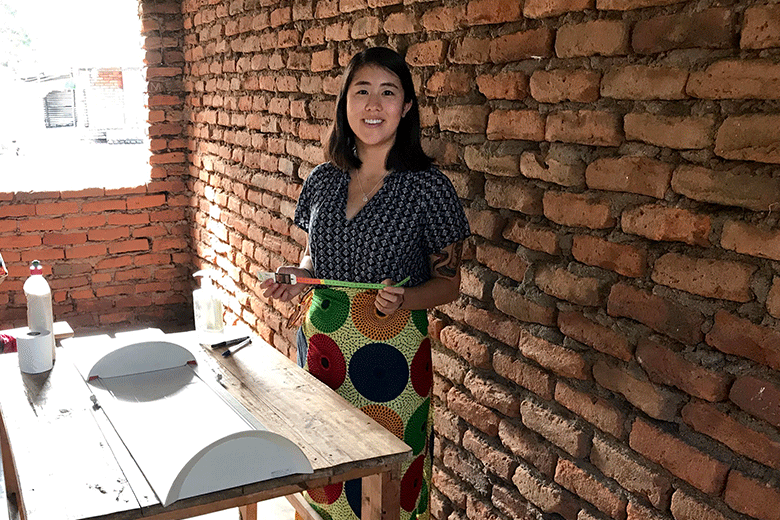
This year, Cal Poly started offering the option for dietetic interns to complete their elective rotations internationally. Two Cal Poly interns had the opportunity to work in Malawi on a grant. In exchange, two dietetic interns from Malawi would come to California the following year. I knew that it would be filled with challenges, and that I would be uncomfortable at times, but above all, I wanted to keep an open mind and learn as much as possible. I wanted to go to Malawi to gain a new perspective and learn about practicing dietetics in a developing nation. ![]()
Week 1: Project Peanut Butter
After more than 30 hours of travel time, we arrived in Malawi. My first week was with a nonprofit organization that produces and distributes fortified peanut butter to address poor nutritional status among children. I worked with the clinic team in rural malnutrition clinics, where I took body measurements and collected urine and stool samples for a study.
For two nights, I stayed with volunteers in a rural village, which had fewer amenities than the larger city of Blantyre, such as clean tap water. In the village, we typically didn’t have running water and lived in much dirtier areas. It was eye-opening and heart-breaking to see how the villagers lived.
Week 2: Queens Hospital
My second week was at Queens Hospital, a public hospital in Blantyre with over 1,000 beds that relies entirely on paper charts. There was a learning curve, since reliable information was not readily accessible, but we navigated this challenge by increasing face-to-face interaction with nurses to learn more about patient conditions and nutritional status. My preceptor and I worked with pediatric patients where we encountered many unique patients. One patient was the second patient to ever receive total parenteral nutrition, or TPN, at the hospital. She had little usable bowel after several surgeries so TPN was lifesaving.
Queens Hospital did not have a registered dietitian nutritionist – the entire country only has eight RDNs. Much of the nutritional burden was placed on the foodservice department who assessed if patients needed to be put on specific diets. The kitchen equipment was in poor shape and they didn’t even have a refrigerator, but I was inspired by the staff’s genuine desire to help the patients despite these difficulties.
Week 3: Permaculture
For our final week, we traveled to Lilongwe to learn about permaculture and the intersection between nutrition, sustainability, and policy. Permaculture is difficult to sum up, but it involves utilizing all resources and space efficiently. The placement of each plant is done with intention and purpose, so that the entire garden is working synergistically. It was nice to be on the farm, where we were away from technology and could enjoy each other’s company over dinner and Malawian board games.
We also took some time to meet with local agriculture and nutrition officials. Both the agriculture official and nutrition official had similar things to say about barriers to diversifying diets of Malawians – much of it had to do with mindset, attitudes, and culture, rather than an actual lack of knowledge or food.
Back Home
I’m eternally grateful for the experiences I have had over the entire internship, but especially for the unique perspective that working globally has granted me. I plan to do more global work in the future, but for now I’m sticking to the United States for my first job as an RDN!


